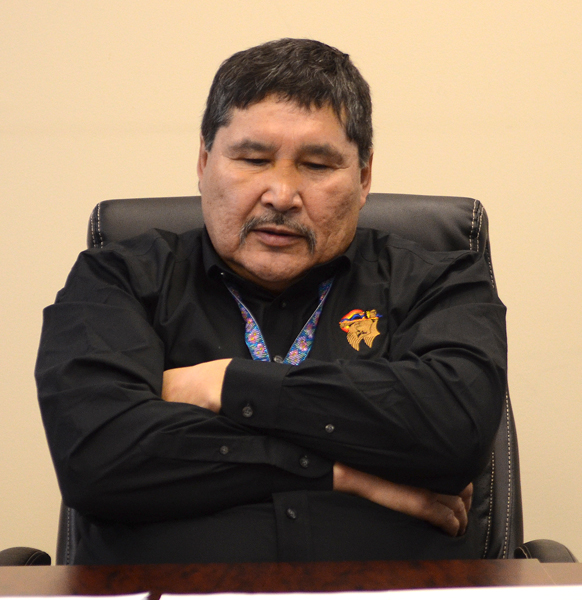There were various reactions to Premier Scott Moe’s announcement of the upcoming end of proof of vaccination and other health measures by the end of February.
The Federation of Sovereign Indigenous Nations (FSIN), Yorkton Tribal Council (YTC), Prince Albert Grand Council (PAGC), Battlefords Agency Tribal Chiefs (BATC), and the Meadow Lake Tribal Council (MLTC) are calling on the province to reconsider their plans because it puts First Nations communities at greater risk. First Nations are one of the most vulnerable populations in the province, they said, and ending the public health protocols will only increase outbreaks and emergencies in our communities.
“We consider COVID-19 a serious threat and we will follow the directives from the Northern Inter-Tribal Health Authority,” PAGC Grand Chief Brian Hardlotte said. “If there is any double about the threat of this virus, then we should err on the side of caution, not carelessness.
“We trust that our Medical Health Officer is monitoring the situation on a daily basis, and that he will determine changes depending on the best available evidence. At this time, we cannot let our guards down and we will continue to practice all safety precautions as directed.”
Other Indigenous leaders echoed Hardlotte’s concerns. MLTC Tribal Chief Richard Ben said northern communities have been some of the hardest hit in Saskatchewan. He said ending measures without proper consultation with First Nations leaders will only create more outbreaks and put more pressure on healthcare workers.
“Our communities’ health resources can’t afford to take another hit or wave of COVID hospitalizations,” Ben said.
FSIN Chief Bobby Cameron said First Nations communities have worked “around the clock” to keep vulnerable residents safe. Reducing or eliminating provincial health protocols will put those people are risk all over again, something he said Indigenous people are not prepared to do.
“Our fight against COVID-19 is not over,” Cameron said. “Therefore, we will continue to follow all our safety measures and COVID protocols until this is over. It is not safe to ease any restrictions. Our First Nations communities are still currently at a greater risk than the rest of the province and we must keep them safe.”
The Saskatchewan Federation of Labour also criticized the province’s decision. SFL president Lori Johb said COVID case and hospitalization numbers are still too high to remove the restrictions.
“COVID-19 still remains a serious health and safety threat for workers,” Johb said in a release. “By removing proof of vaccination requirements, workers are at greater risk of contracting the virus.”
The SFL said that they continue to demand that the government ensure proper PPE for all workers, legislate ten days of paid sick leave for all workers and ensure safe staffing levels in our hospitals, schools, and other public services
“We all want the pandemic to end, but we need to remain vigilant to make sure that workers are kept safe,” Johb said. “Taking the steps we’ve outlined would go a long way to making sure that we are able to successfully beat COVID-19 once and for all and ensure that our health care system is not overwhelmed.”
Johb also raised concerns about workers facing harassment as health orders are lifted and workers continue to take precautions and wear PPE.
“Workers have the right to be safe at work, and should be able to have access to and wear the PPE that they need to avoid contracting COVID,” Johb said. “Both the government and employers must make sure that workers are able to wear whatever PPE they need to be safe without facing harassment from members of the public.”
The Canadian Federation of Independent Business (CFIB) on the other hand was pleased with the announcement. CFIB president Dan Kelly released a statement saying they were pleased to see the provincial government lead the way in lifting COVID restrictions.
“Today’s announcement marks a huge step towards recovery and a new phase for Saskatchewan small businesses,” Kelly said in a press release.
“As we press forward, it is important that we don’t slide back. We continue to call on the Saskatchewan government to develop a “stay-open” plan to provide clarity and certainty as we continue to manage the pandemic. Importantly, this would include ensuring there is adequate healthcare capacity to avoid any fresh rounds of restrictions or business closures.”
Kelly added that removing business restrictions is a big step, but really only the first towards a small business recovery plan.
According to the CFIB only 36 per cent of Saskatchewan small businesses are at normal sales and 15 per cent are still actively considering bankruptcy. The average prairie small business has inherited nearly $100,000 in new debt just to survive the restrictions of the past two years.
“We call on the Saskatchewan government to back up today’s announcement with a plan to boost consumer confidence over the weeks ahead. After two years of uncertainty, messaging needs to shift towards encouraging the safe return to activities like dining, seeing a movie, going to the gym, events and travel so that our small businesses can begin the long road to recovery,” the statement reads.


